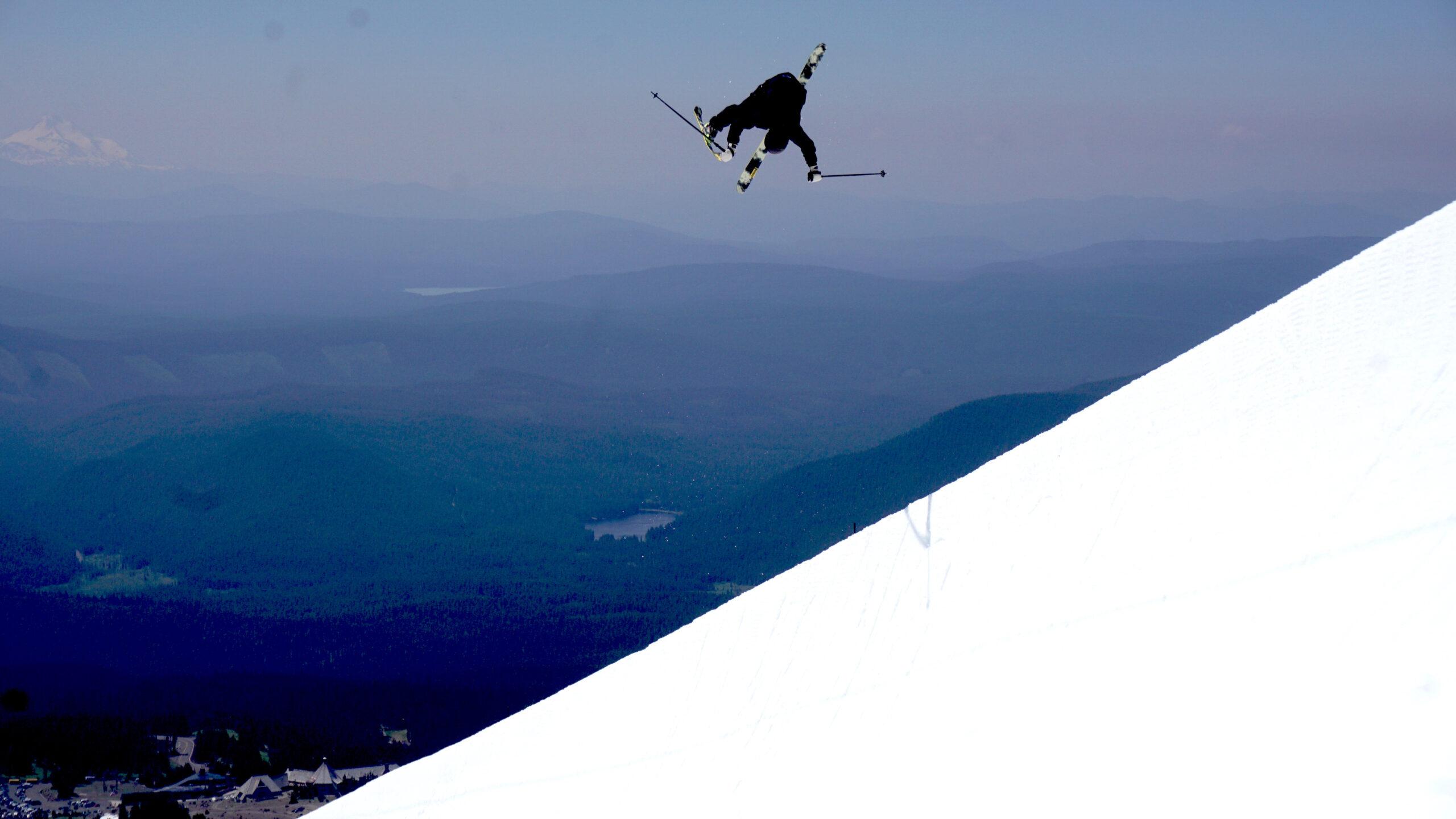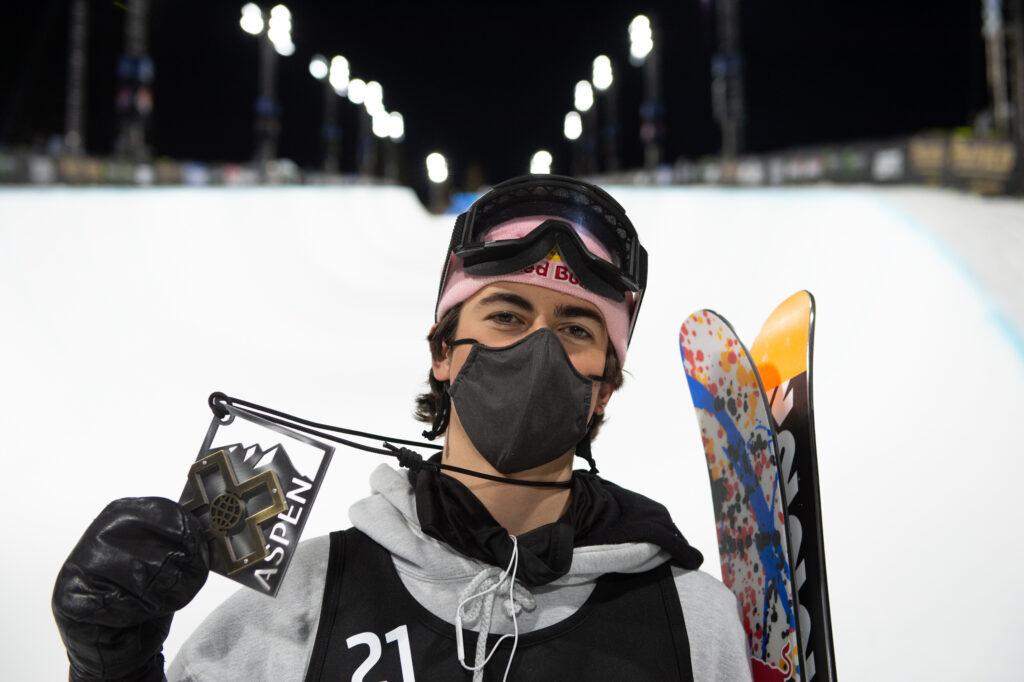
What goes through Birk Irving’s mind as he skis up the wall of a halfpipe, flips and twists in the air, then lands just in time to hurtle up the other side?
Nothing.
“I mean, half the time I'll get to the bottom, I don't even remember what I just did,” Irving said.
Instead, he relies on muscle memory from countless practice runs.
Irving is a freeskier from Winter Park, where his dad is the director of the ski patrol. His mom teaches Spanish at Middle Park High School in Granby. They put young Birk on skis when he was 2 years old, and soon realized he would never be satisfied to just ski head downhill.
“I was,” Irving explained, “a super-airborne child.”
Irving landed his first 360 spin on skis when he was 5 years old, and got his first sponsorship — from K2 skis — at the age of 7.
Now he’s one of 23 Coloradans who will compete for Team USA at the Beijing Winter Olympics, which kick off this week.
Irving joined Colorado Matters to talk about his sport before he heads to Beijing next week.
This interview has been edited for clarity and length.
Nathan Heffel: What is your biggest trick?
Birk Irving: I’ve got some big tricks I want to throw down, but I'd say my hardest one would probably be a double cork 1620.
Heffel: And what is that?
Irving: It's four and a half rotations and two flips. So basically two backflips and then four and a half 360s.
Heffel: How high in the air do you have to be to do that?
Irving: It kind of varies for everybody, but for me I have to go at least 10 to 15 feet above the 22-foot walls. So pretty high.
Heffel: Is that pure momentum or do you have to jump? How does that work?
Irving: It's all pumping and g-forces through the bottom of the halfpipe. So in the transitions of it, down into the bottom, you're pumping and pushing your legs. You try and gain momentum and go as fast as you can. And it's different for almost every halfpipe, because they're all on different slopes and different angles. But China: I've skied there before. It's a pretty fast, steep halfpipe. It's on a pretty steep pitch. And so it's just all the momentum you carry through the halfpipe and where you land as well, high on the transition, like high on the wall.

Heffel: Is it typical that when you're going through a run, you're going to do your toughest trick? Or is it all about finesse, and choosing what you're going to do to make it the best for the judges?
Irving: It kind of goes both ways. You pick and choose your battles. For me personally, I'll prioritize doing a trick that’s going to look better and that I can execute better. If I have, say, one trick that's a bit bigger on the rotation side and difficulty, but it's not done as well or executed as well, I'm going to go for the more mellow trick so I can make it look better and make it look cleaner and smoother.
Heffel: What do you think about when you're in the air?
Irving: A lot of it is muscle memory. We have these training camps, and we do all these tricks over and over and over, just to get the repetition of it. At the top, you're trying to focus in on what your run is, and where you need to land on the wall, and how much you need to push off the wall in certain spots and all that. But then as soon as you drop in — I personally am not thinking about anything. I'm just going, and my body's doing the work. I mean, half the time I'll get to the bottom, I don't even remember what I just did. It’s almost like your body just takes over and your mind's just kind of along for the ride, you know? It's a pretty cool feeling.
Heffel: There are 23 Coloradans on this team. You must know a lot of them. Do you see them as friends or competitors?
Irving: We have a super cool relationship. None of us are real competitors against each other. I mean obviously, at the end of the day we all want to win, but we're all really good friends. We've all grown up together, we have such a good relationship and we all get along so well. So we always want the best for one another. At the end of the day, we definitely all want to win, but it never gets in the way of our friendships or relationships.
Heffel: For those of us who stay on the ground when we ski — or maybe all the time — what's something we may not know about what you do?
Irving: When you watch a halfpipe event, you see people spinning both directions, so left and right on both walls. If you would like to, you can try and spin both directions, just standing in your living room. You'll have a dominant way of spinning. For a lot of us, it's left, and so trying to learn those other tricks to the right, which is completely unnatural to us, is one of the things that's hard to notice and hard to comprehend.
Heffel: So if I stand in my living room and spin in one direction, I'll naturally feel which way feels more comfortable? And that's what you do when you're first starting out?
Irving: Yep, exactly. I started spinning left and I had a rude awakening when I was coming into the competition scene and had to start spinning right. And I was like, this just does not make any sense! Over time, you slowly begin to figure it out, but you'll always have one way that feels way more natural than the other.
Heffel: You don't leave for China until next week, and you have to test negative for COVID-19 before you go. What's it been like to have COVID hanging over your Olympic career?
Irving: It’s been super stressful, for sure. I mean, I completely understand the rules that are put in place are for everybody's safety. It’s just extremely nerve-wracking, especially just with how rampant it's running right now. But we've all just been super safe. We've been in our team bubble, not going outside, not getting food anywhere — it's all takeout. So it has definitely been stressful, but I think just taking the right precautions and being super safe, I'm sure it'll be fine. Knock on wood, but definitely a stressful time.









